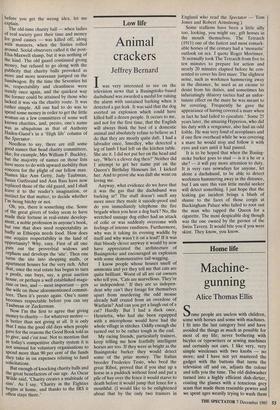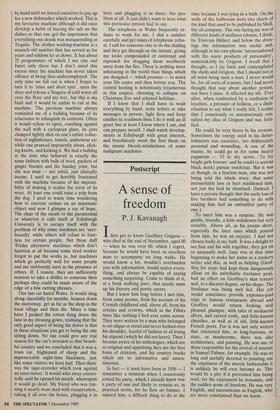Home life
Machine-
Alice Thomas Ellis
by hand until we forced ourselves to pay up for a new dishwasher which worked. This is my favourite machine although it did once develop a habit of leaving the salt on the dishes so that one got the impression that everything one drank was masquerading as Tequila. The clothes washing-machine is a staunch old number that has served us for years and seldom let us down. It has about 25 programmes of which I use one and Janet only three but I don't mind this excess since the machine has never taken offence at being thus underemployed. The only time we fall out is when I forget to turn it to 'rinse and short spin', open the door and release a Niagara of cold water all over the floor and my feet, but this is my fault and it would be unfair to rail at the machine. The previous machine always reminded me of a bulldog because of its reluctance to relinquish its contents. Often it would refuse to open, couching against the wall with a cyclopean glare, its jaws clamped tightly shut on one's entire collec- tion of nightdresses, towels, underwear etc while one pranced impotently about, click- ing knobs, and kicking it. We had a bulldog at the time who behaved in exactly the same fashion with balls of wool, packets of ginger biscuits and the Sunday joint, but she was mad — not rabid, just clinically insane. I used to get horribly frustrated with the machine because of the impossi- bility of making it realise the error of its ways. At least one could raise a yelp from the dog. I used to waste time wondering how to exercise sadism on an inanimate object and now I glimpse a ray of hope. The chair of the occult or the paranormal or whatever it calls itself at Edinburgh University is to occupy itself with the problem of why some machines are 'user- friendly' while others will refuse to func- tion for certain people. Not those duff `Friday afternoon' machines which don't function at all because some tired worker forgot to put the works in, but machines which go perfectly well for some people and are stubbornly inert in the presence of others. If, I reason, they are sufficiently sentient to take a dislike to someone then perhaps they could be made aware of the edge of a few cutting phrases.
Our last car hated Wales. It would chug along cheerfully for months, bounce down the motorway, get as far as the shop in the local village and then die. Many a time have I pushed the rotten thing down the lane in my dressing-gown, realising that the only good aspect of being the driver is that in these situations you get to being the one sitting down. No one could give any real reason for the car's aversion to that beauti- ful country and we concluded that it was a town car, frightened of sheep and the impenetrable night-time blackness, just like some visitors we have had. Then there was the tape-recorder which took against an interviewee. It would whir away conten- tedly until he opened his mouth, whereupon it would go dead. My friend who was run- ning it nearly went mad with exasperation, taking it all over the house, plugging it in here and plugging it in there. No pro- blem at all. It just didn't want to hear what this particular person had to say.
The telephone in Wales frequently re- fuses to work for me. I dial a number carefully and get tones of telephonic refus- al. I call for someone else to do the dialling and they get through on the instant, giving me looks compounded of contempt and reproach for dragging them needlessly away from the fire. There is nothing more infuriating in the world than things which are designed — which promise — to make your life easier and then betray you. The central heating is notoriously treacherous in this respect, choosing to collapse on Christmas Eve and selected holidays.
If I know that I shall have to wash everything by hand, write letters or take messages in person, light fires and keep candles in readiness then I do it with an ill grace but at least I know where I am, and can prepare myself. I shall watch develop- ments at Edinburgh with great interest, and breathlessly await the first thesis on the innate bloody-mindedness of some malignant machines.



































































 Previous page
Previous page